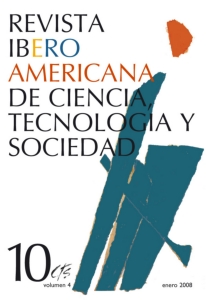A Participação Pública no Contexto dos Projetos Tecnológicos
DOI:
https://doi.org/10.52712/issn.1850-0013-919Palavras-chave:
participação pública em ciência e tecnologia, projetos tecnológicos, metodologias de participaçãoResumo
A participação pública em ciência e tecnologia tem se desenvolvido com maior intensidade no nível macro, no contexto de políticas e programas, âmbitos que assumiram um papel central nas análises e reflexões sobre o envolvimento da sociedade civil nos sistemas de I&D. O próximo desafio a ser enfrentado consiste em incorporar as dinâmicas de participação no contexto dos projetos científicos e tecnológicos, uma vez que é nesse espaço que ocorre a produção real do conhecimento. Essa transição para a dimensão micro exige um aprofundamento sobre os fundamentos e a oportunidade da participação social em projetos — uma reflexão que deve estar vinculada ao estudo dos condicionantes derivados da pequena escala, da dificuldade de atrair os atores sociais para uma dinâmica de participação local e, sobretudo, da dificuldade de oferecer cotas reais de decisão aos participantes. O presente artigo justifica a presença da participação no contexto dos projetos tecnológicos, em qualquer uma das fases de seu ciclo de vida, refletindo sobre os condicionantes e obstáculos que a afetam.
Downloads
Referências
ABET (2003): "Criteria for Accrediting Engineering Programs", Engineering Accreditation Commission, ABET, Inc., disponible electrónicamante en http://www.abet.org/Linked%20Documents-UPDATE/Criteria%20and%20PP/E001%2007-08%20EAC%20Criteria%2011-15-06.pdf
BEDER, S. (1998): The New Engineer: Management and Professional Responsibility in a Changing World, Palgrave MacMillan.
CASTELLS, M. (1982): "Squatters and Politics in Latin America", en H. J. Safa (ed.): Towards a Political Economy of Urbanization in Third World Countries, New Delhi, Oxford University Press, pp. 242-262.
CHECKLAND, P. (2002): System Thinking, Systems Practice, John Wiley and Sons.
CLELAND, D. y W. KING (1975): System Analysis and Project Management, New York, McGraw-Hill.
DAHL, R. (1957): "The concept of Power", Behavioral Science, nº 2, pp. 201-205.
FIORINO, D. J. (1990): "Citizen Participation and Environmental Risk: A Survey of Institutional Mechanisms", Science, Technology, and Human Values, 15/2, pp. 226-243. Citado en J. A. López Cerezo, J. A. Méndez Sanz y O. Todt (1998): "Participación pública en política tecnológica. Problemas y perspectivas, Arbor, CLIX, 627, pp. 279-308, accesible electrónicamente en http://www.oei.es/salactsi/arbor.htm
FUNTOWICZ, S. y J. RAVETZ (1993): La ciencia posnormal: ciencia con la gente, Buenos Aires, Icaria.
GONZÁLEZ GARCÍA, M. I., J. A. LÓPEZ CEREZO y J. L. LUJÁN LÓPEZ (1996): Ciencia, Tecnología y Sociedad: Una introducción al estudio social de la ciencia y la tecnología, Madrid, Tecnos.
GRAEDEL, T. E. y B. R. ALLENBY (2003): Industrial Ecology, Prentice Hall, Englewood Cliffs, Prentice Hall.
GYARMATI, G. (1992): "Reflexiones teóricas y metodológicas en torno a la participa-ción", Estudios Sociales, Nº 73.
HEERKENS G. R. (2002): Project Management, New York, McGraw-Hill.
INVERNIZZI, N. (2004): "Participación ciudadana en ciencia y tecnología en América Latina: una oportunidad para refundar el compromiso social de la universidad públi-ca", Revista Iberoamericana de Ciencia, Tecnología y Sociedad - CTS, Nº 2, Vol. 1, pp. 67-83.
METCALFE, L. y S. RICHARDS (1989): La modernización de la gestión pública, Madrid, M.A.P.
MITCHAM, C. (1997): "Justifying Public Participation in Technical Decision Making", IEEE Technology and Society Magazine, Spring, pp. 40-46.
RUSSELL, B. (1938): Power. A New Social Analysis, New York, W.W. Norton & Company.
THE INSTITUTION OF ENGINEERS AUSTRALIA (1992): Environmental Principles for Engineers, accesible electrónicamente en http://ees.ieaust.org.au/pdf/environ_ principles.pdf
UNGER, S. H. (1994): Controlling Technology: Ethics and the Responsible Engineer, New York, Wiley Interscience.
Downloads
Publicado
Como Citar
Edição
Seção
Licença
Copyright (c) 2025 CC Attribution 4.0

Este trabalho está licenciado sob uma licença Creative Commons Attribution 4.0 International License.
Todas os números de CTS e seus artigos individuais estão sob uma licença CC-BY.
Desde 2007, a CTS proporciona acesso livre, aberto e gratuito a todos seus conteúdos, incluídos o arquivo completo da edição quadrimestral e os diversos produtos apresentados na plataforma eletrônica. Esta decisão é baseada no entendimento de que fornecer acesso livre aos materiais publicados ajuda a ter uma maior e melhor troca de conhecimentos.
Por sua vez, em se tratando da edição quadrimestral, a revista permite aos repositórios institucionais e temáticos, bem como aos sites pessoais, o autoarquivo dos artigos na versão post-print ou versão editorial, logo após da publicação da versão definitiva de cada número e sob a condição de incorporar ao autoarquivo um link direcionado à fonte original.











